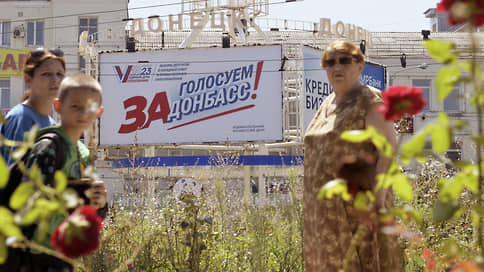Only parliamentary parties will participate in elections in the new territories
[ad_1]

On Thursday, the stage of nominating candidates for deputies of the legislative assemblies of the new regions — the Donetsk and Luhansk People’s Republics (DPR and LPR), as well as the Zaporozhye and Kherson regions, ended. You can’t call it hype: the lists were submitted only by the parliamentary “five”, exempted from the need to collect signatures to participate in the elections, and the “small” parties, which needed to enlist the support of up to 10 thousand local residents, did not try to join the struggle. But even the Duma “beneficiaries” will not participate in the elections in full force everywhere.
Lists of candidates for the People’s Councils of the DPR and LPR were put forward by all the parties represented in the State Duma – United Russia (ER), the Communist Party of the Russian Federation, the Liberal Democratic Party, Just Russia – For Truth (SRZP) and New People. According to the GAS “Vybory”, the Luhansk electoral committee has already registered all the participants in the campaign, while the Donetsk one has so far only the Liberal Democrats and Socialist-Revolutionaries. The registration process will last until August 23.
Recall that the elections of the first convocations of the legislative bodies of the new constituent entities of the Russian Federation will be held exclusively according to party lists. 90 and 50 deputies will be elected to the People’s Councils of the republics, respectively, to the Zaporozhye Legislative Assembly – 40, to the Kherson Regional Duma – 36. By law, Duma parties have the right to nominate candidates without collecting signatures, and all the rest need to enlist the support of 0.5% of voters in the region. In the DPR, this threshold was 9 thousand signatures, in the LPR – 9.9 thousand, in the Zaporozhye region – 3.3 thousand, in the Kherson region – 1.7 thousand. Half of them could be collected through the State Services.
However, none of the “small” parties even tried to put forward their lists. And in the Zaporozhye and Kherson regions, the New People did not do this either. Their press service explained to Kommersant that the party refused to participate because it had not yet registered its cells there: “We are very careful in the selection of candidates. It is difficult to do this without an open party branch in the region.” The “new people” promised “in the future” to open Zaporozhye and Kherson cells and take part “in the next elections.” At the same time, the party has already put forward a list of candidates for the City Council of Energodar (a satellite town of the Zaporozhye NPP).
In “small” parties, the refusal to participate in elections is explained in much the same way. For example, Vladimir Vorozhtsov, deputy chairman of the central council of the Party of Pensioners, told Kommersant that it is “simply unethical” to put forward lists without active cells: “We are actively working in new regions, but have not yet managed to create branches – in the current conditions there are objective difficulties.” According to him, the activists “mostly fight – they are not in the mood for the elections now.”
The lists of United Russia members in the new regions, as Kommersant previously reported (see Kommersant dated August 3), are headed by major federal figures – Acting Heads of Regions Denis Pushilin, Leonid Pasechnik, Evgeny Balitsky and Vladimir Saldo, State Duma deputies Viktor Vodolatsky and Igor Kastyukevich, as well as local politicians – battalion commander of Sparta Artem Zhoga, speaker of the People’s Council of the LPR Denis Miroshnichenko, head of Melitopol Galina Danilchenko, Luhansk senator Olga Bas and others.
At the head of the lists of the Communists are the first secretaries of the republican and regional committees of the party Boris Litvinov, Igor Gumenyuk, Oleg Slyusarenko and Ramil Zamaletdinov, as well as the current deputy of the LPR parliament Alexander Ermolenko. Otherwise, the Communist Party has put forward little-known candidates, many of whom live in the territory of the “old” subjects – Moscow, Krasnodar Territory, Moscow, Ulyanovsk, Amur, Rostov and other regions.
The lists of the Liberal Democratic Party for the elections are traditionally “dragged” by party leader Leonid Slutsky, followed by coordinators of local cells, in particular, the current member of the LPR parliament Maxim Uvarov, former activist of the Melitopol Anti-Maidan Yekaterina Umanets, adviser to the head of the DPR Andrey Kramar and Novokahovsky businessman Nadezhda Pasko . The lists of the party, like those of the Communists, also include many candidates living in Moscow.
At the head of the list of the People’s Council of the DPR, the SRZP has a “locomotive” – State Duma deputy Elena Drapeko (leads the Donetsk cell of the party), and two acting republican deputies – Aleksey Zhigulin and Sergey Telnykh – are immediately behind her. In other regions, the lists are headed by cell leaders Gennady Tarakanov, Yuri Onischuk and Igor Shchepelin.
Finally, the acting deputy of the People’s Council Aleksey Dorofeev is leading the New People to the DPR parliament, and Vadim Kolesnik, a local businessman, is leading to the LPR parliament.
According to political scientist Rostislav Turovsky, the results of the nomination of candidates reflect the actual party situation in the new regions. “The parliamentary parties were the first to come there and gain a foothold. Of these, “New People” did not appear everywhere, but where it was easier. They also did not artificially create the appearance of a multi-party system at the expense of “small” parties. Therefore, the elections simply turned into a competition of parliamentary parties,” the expert states.
[ad_2]
Source link








